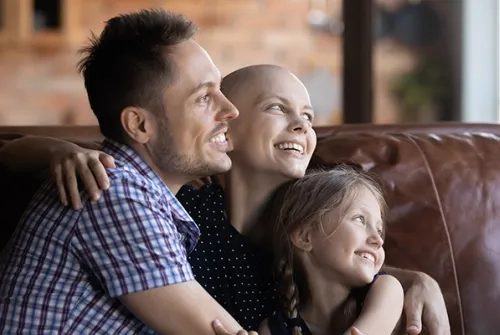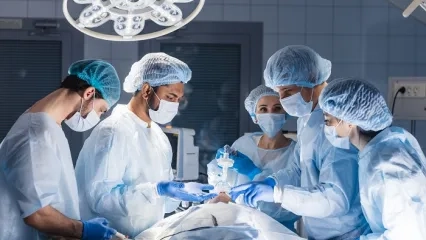Alo Yeditepe
Alo Yeditepe
Emotional Stress May Affect Risk of Recurrence in Breast Cancer
Reminding that there is a close relationship between the immune system and tumor recurrence, General Surgery Specialist Assoc. Prof. Dr. Kinyas Kartal said that emotional relationships can also be effective in breast cancer recurrences due to their effect on the immune system.
Giving information about the study that researchers from the state of Ohio in the USA evaluated and published the results of 139 breast cancer patients, General Surgery Specialist Assoc. Prof. Dr. Kinyas Kartal said that it has been demonstrated once again that, how effective the emotional relationships of patients with their close environment are in both the formation of breast cancer and the treatment of the disease. Yeditepe University Hospitals General Surgery Specialist Assoc. Prof. Dr. Kinyas Kartal told the following about the subject: “When we look at the results, it was seen that the test results of the women who experienced less emotional stress and had a more peaceful and happy relationship at home and in their marriage were statistically better compared to the other patient group. Therefore, we can say that a happier and more peaceful life, marriage, and relationship have a positive effect on the immune system.”
Happier and more Peaceful Life Affects the Immune System
Related to the study investigating the effects of emotional relationships on the immune system Assoc. Prof Dr. Kinyas Kartal told that: “139 married patients with breast cancer have been followed up since the end of the treatment. The emotional stress that they experienced, the dynamics of their marriage, and their relationships with their spouses during the one-and-a-half-year follow-up period, were verbally evaluated with the questions determined by the researchers. During this period, blood taken from the patients was analyzed and information about the immune system was obtained through a group of blood tests called “C-Reactive Protein (CRP) and Tumor Necrosis Alpha, Interleukins, which show the level of inflammation in the body. Looking at the results, it was seen that the results of the women who experienced less emotional stress and had a more peaceful and happy relationship at home and in their marriage were statistically better than the other patient group. Therefore, we can say that a happier and more peaceful life, marriage, and relationship have a positive effect on the immune system.”
There Are Also Similar Research
Stating that other medical research studies can also be an example in this regard in addition to the aforementioned study in America, Assoc. Prof. Dr. Kinyas Kartal said, “In a study published in the Nature journal group, when the long-term follow-up results of 282,203 breast cancer patients were examined, it was seen that tumor recurrence was significantly higher in patients with depressive and high anxiety levels compared to their peers, statistically.”
Stress, Anxiety, and Depression Affect Both Disease Occurrence and Treatment
Underlining that depending on all these results, emotional states such as stress, depression, and anxiety are very important in breast cancer both in the emergence of the disease and compliance with treatment, Assoc. Prof. Dr. Kinyas Kartal also pointed out that it is also effective in the recurrence and progression of the disease in patients who are in the follow-up process after the treatment is over. Assoc. Prof. Dr. Kartal gave the following information about the effect of stress on the mechanism of cancer:
“The disease we call cancer is caused by the uncontrolled reproduction of cells by disrupting the normal reproduction cycle of cells. Normally, various intracellular and extracellular pathways initiate the division of cells. These pathways are controlled by making them active or inactive through hormones, electrolytes, and many different mechanisms. Long-term stress can lead to disorders in this mechanism. If you ask, “Well, doctor, does stress alone cause cancer?”, it is very difficult to answer this question, scientifically. But when stress is added to factors such as environmental factors, radiation, genetic predisposition, multiple factorial changes increase the risk of cancer.”
“The Process Should Be Made Easy For The Patient”
Pointing out that some factors cannot be changed in the patient's response to treatment, both the patient and the tumor's characteristics, Assoc. Prof. Dr. Kinyas Kartal said, “In addition to factors such as the structure of the tumor or the age of the patient and his physical activity; stress, restlessness, and the emotional state of our patient are very important in this process. It's really hard to treat a patient who doesn't believe she will get better. In this period, we see every day in the clinic that the patient's feeling of mental safety and peace contributes quite positively to the treatment. Our patients, who have established healthy relationships with their spouses and families, and have found the support they seek, have higher adaptation and response to treatment. This is what was emphasized in the study.”
Breast Cancer Treatment Success Increases at Every Stage
Assoc. Prof. Dr. Kinyas Kartal said that patients who are faced with such a situation should accept the situation and embark on a treatment journey as soon as possible, even though it is difficult, and spoke; "After this stage, the only thing we will do is to work and fight with all our strength to overcome this disease." Noting that the success of the treatment of breast cancer is increasing day by day at every stage, Assoc. Prof. Dr. Kinyas Kartal continued his words about the relatives of the patients as follows: “As physicians, the number of powerful weapons we will use in this fight is increasing. As physicians, we try to do as much as we can with research and developments. But our patient goes to her own home after surgery or chemotherapy. When that patient closes the door of her house, she stays alone with his husband, mother, father, children, and very close friends. Here, too, there are duties for our patients and their relatives. It doesn't help anyone to make already difficult processes even more difficult. Our patient should believe in her treatment, and know that she can overcome it, and her relatives should support her on this path. Negative thoughts affect our success a lot. Our depressed, unhappy, and stressed patients are crushed under the psychological burden as well as the physical burden. We do not want unhappiness and despair.”
Press Coverage: aksam | halktv | star | cnnturk | medyatava | gazetevatan | haberler | cumhuriyet
About
Faculty and Year of Graduation:
Başkent University Faculty of Medicine, 2006
”
See Also
- What is Gallbladder Surgery?
- Patched Solution for Umbilical Hernia
- Swallowable Gastric Balloon
- What Are the Symptoms of Gallbladder Stones? How Is It Treated?
- 3 Major Developments Shaping Treatment in Colon Cancer
- Can Weight Loss Despite Not Dieting Be a Sign of Cancer?
- He Came to Turkey to Get Rid of the Colostomy Bag
- Although Her Fears Prevented Her from Going to the Hospital, She Managed to Beat Breast Cancer at the Age of 70
- Breast Cancer Screening Applications Decreased by 10% Before the Pandemic
- Facts About Breast Cancer
- Liver Cancer (Tumor) and Treatment
- Gallbladder Stones
- What Is Appendicitis?
- Questions About Gastroenterology Surgery
- What are the Types of Obesity Surgeries?
- Questions About Obesity Surgery
- A New Era in Obesity Surgery
- Overweight
- Are Obesity Surgeries Risky?
Alo Yeditepe





